HVAC Companies Clay Cross
Find top AC and Heating Services in Clay Cross
Get up to 3 Heating and Cooling Services quotes for your project today! Compare profiles, reviews, accreditations, portfolio, etc... and choose the best offer.

Complete Cooling Services Ltd
524 reviewsUnit 4a, Huss's Lane, Long Eaton, NG10 1G, GBComplete Cooling Services is a local HVAC engineers company providing the best services for heating, ventilation & air conditioning. With over 107 years of combined industry experience and knowledge, our team of highly trained and skilled HVAC engineers deliver exceptional services. We provide a seamless and reliable service when it comes to your HVAC systems installation, maintenance and repairs. Our services include air conditioning installation, repairs, service & maintenance, planned preventative maintenance, and more. We are a local company dedicated to ensuring that all of our customers get the very best service and support when it comes to their air conditioning and comfort cooling requirements.
- Services
- Why Us?
- Our Team
- Gallery
Get Quote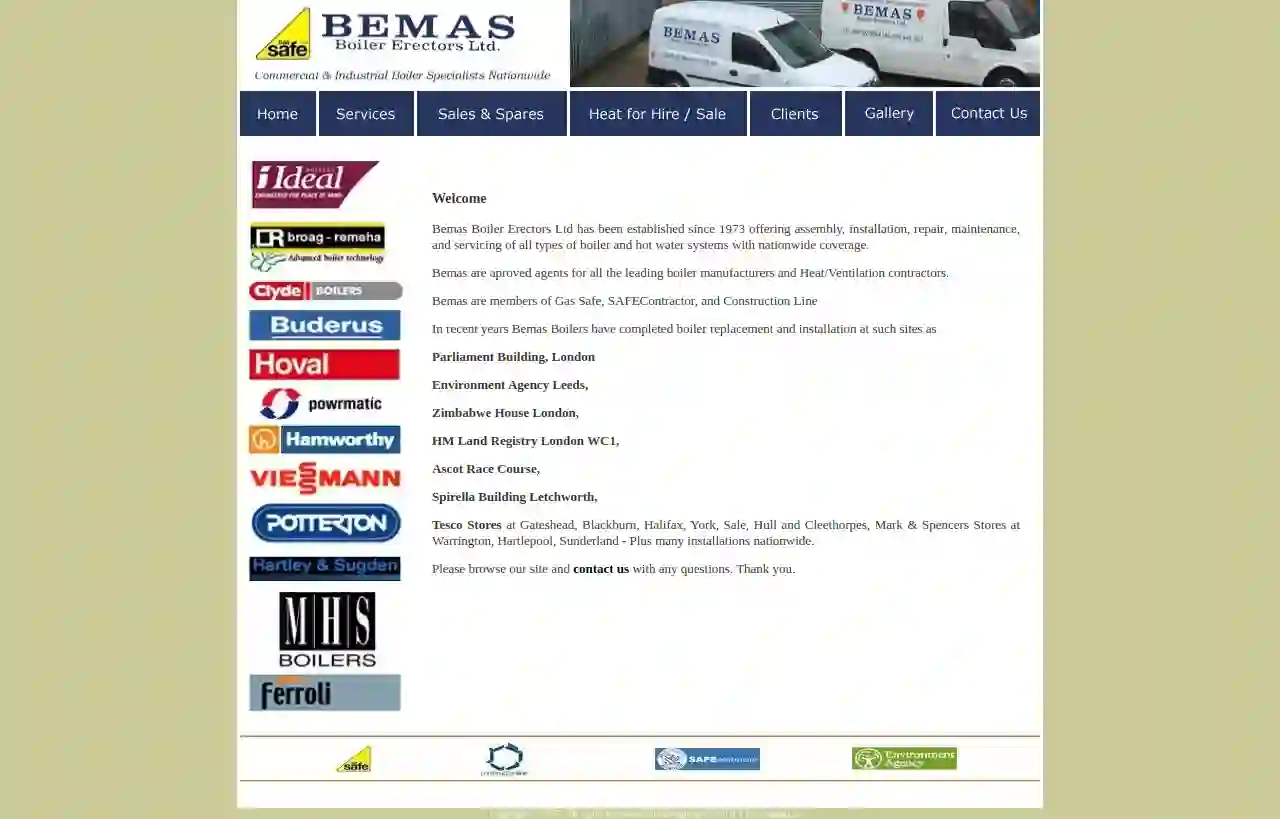
Bemas Boilers Ltd
Cilfton Avenue, Long Eaton, NG10 2GA, GBBemas Boiler Erectors Ltd has been established since 1973 offering assembly, installation, repair, maintenance, and servicing of all types of boiler and hot water systems with nationwide coverage. Bemas are approved agents for all the leading boiler manufacturers and Heat/Ventilation contractors. Bemas are members of Gas Safe, SAFEContractor, and Construction Line. In recent years Bemas Boilers have completed boiler replacement and installation at such sites as Parliament Building, London, Environment Agency Leeds, Zimbabwe House London, HM Land Registry London WC1, Ascot Race Course, Spirella Building Letchworth, Tesco Stores at Gateshead, Blackburn, Halifax, York, Sale, Hull and Cleethorpes, Mark & Spencers Stores at Warrington, Hartlepool, Sunderland - Plus many installations nationwide. Please browse our site and contact us with any questions. Thank you.
- Services
- Why Us?
- Gallery
Get Quote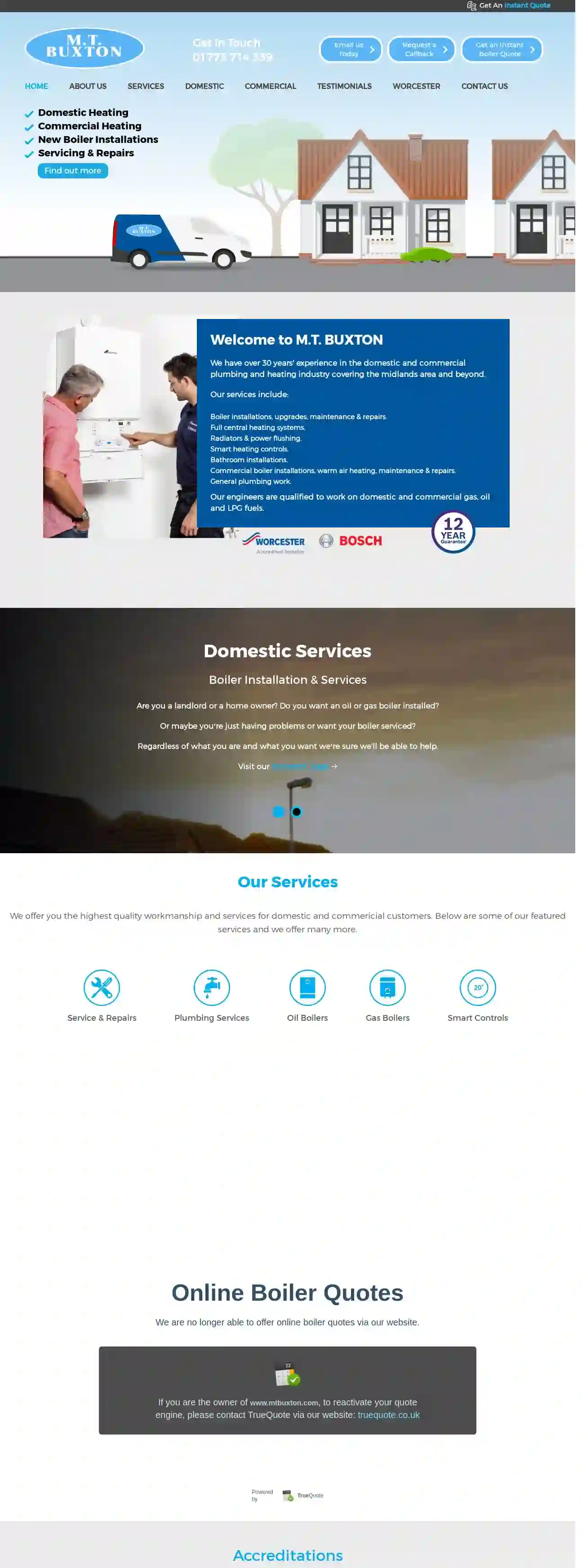
M T Buxton Plumbing & Heating
423 reviewsLangley Mill, 237-241 Station Road, Nottingham, NG16 4AD, GBM.T. Buxton Plumbing & Heating is a company with a structured management team which has a wealth of experience on a variety of domestic and commercial work. We have a solid client base reflecting the twenty four years the company has been in existence and as any reliable contractor we are always seeking to expand and develop. Our client list currently includes the Co-Operative Group, Sandicliffe Motors and Repton School to name just a few. We are confident and well able to meet the demands in providing both quality and competitive quotations for a wide spectrum of domestic and commercial work. We are adequately staffed to handle a wide range of contracts from domestic works up to the multi-disciplined service installations associated with larger projects. The company's Senior management, and the assigned contracts engineer, closely monitor the installations to maintain our high standard of workmanship, working closely with all of our directly employed labour force. Our company strategy pursues contracts throughout the UK which would include installation work, planned and reactive maintenance. We trust this proves of sufficient interest and we would welcome any enquires either by our contact page.
- Services
- Why Us?
- Accreditations
- Gallery
Get Quote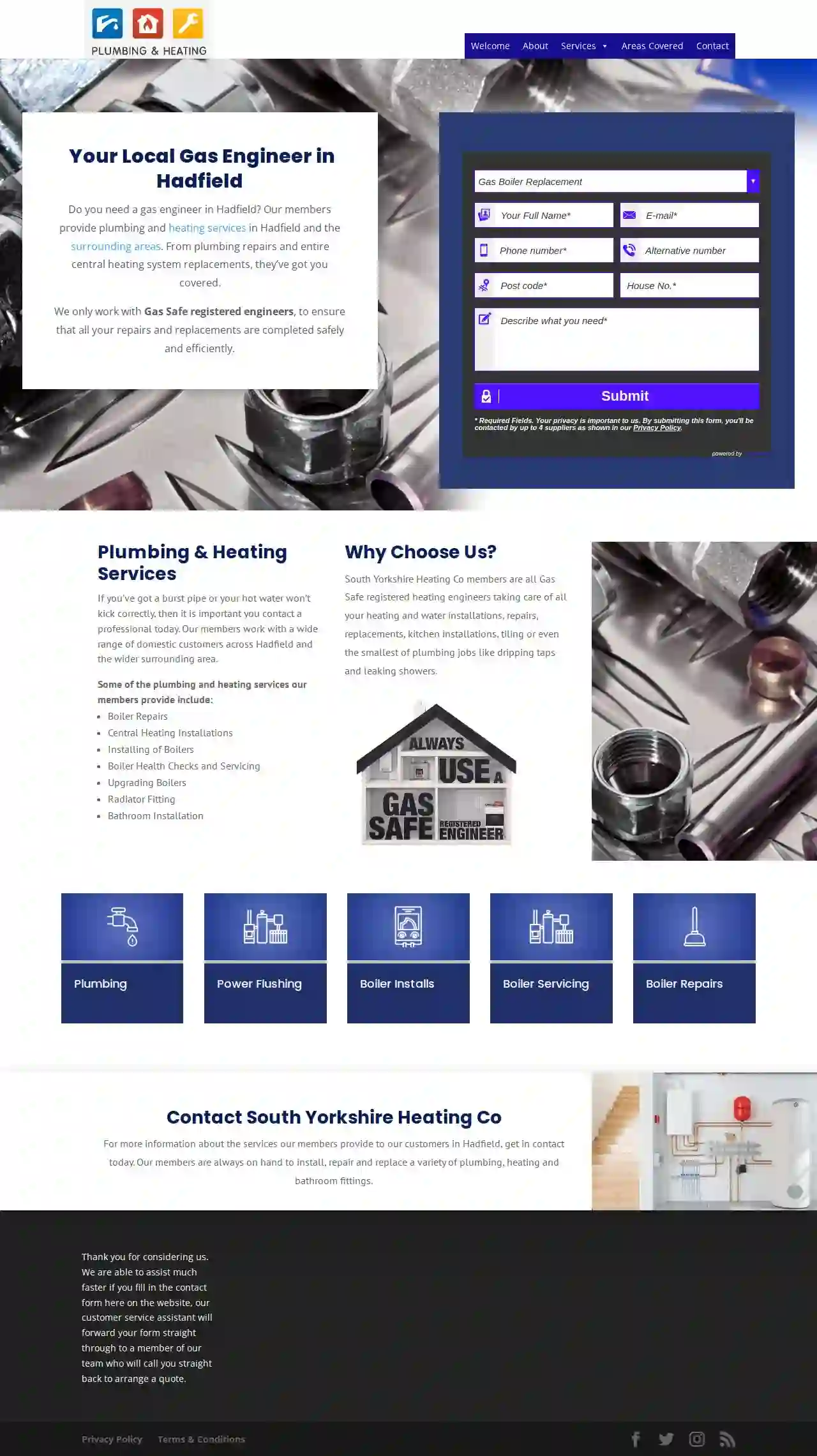
MWF HEATING SERVICES LTD
54 reviewsUnit 1, 100-102, Sheffield Road, Hadfield, S20 1AA, GBSouth Yorkshire Heating Co connects you with Gas Safe registered heating engineers across South Yorkshire and the surrounding areas. Whether you need a plumber or a heating engineer, our members are here to help with all your plumbing and heating needs, from small repairs to complete system replacements. They provide a wide range of services, including boiler installations, repairs, servicing, power flushing, smart thermostat installations, and more. For peace of mind, all our members are fully qualified and insured, ensuring your work is completed safely and efficiently.
- Services
- Why Us?
- Gallery
Get Quote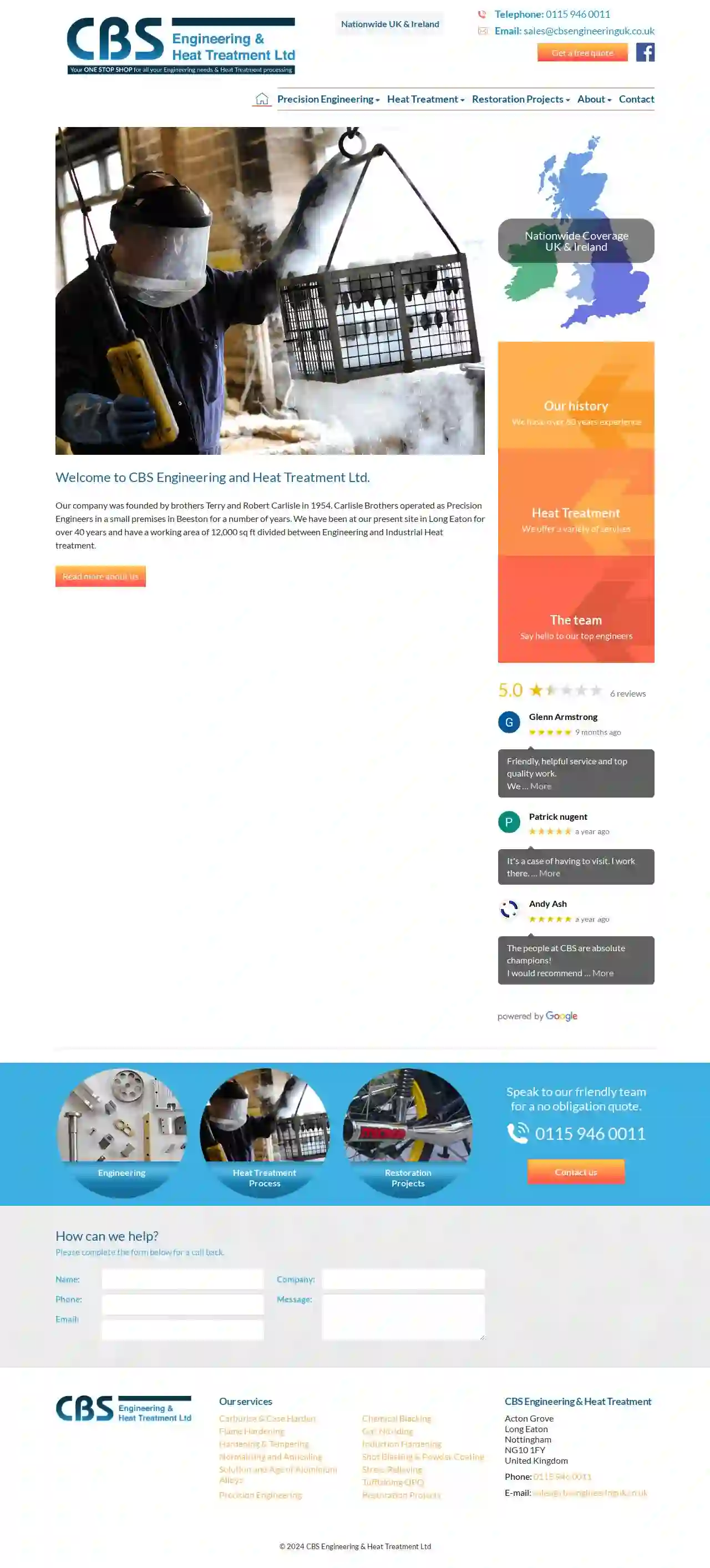
C B S Engineering and Heat Treatment Ltd
56 reviewsLong Eaton, Nottingham, Acton Grove, NG10 1FY, GBWelcome to CBS Engineering and Heat Treatment Ltd. Our company was founded by brothers Terry and Robert Carlisle in 1954. Carlisle Brothers operated as Precision Engineers in a small premises in Beeston for a number of years. We have been at our present site in Long Eaton for over 40 years and have a working area of 12,000 sq ft divided between Engineering and Industrial Heat treatment. Read more about us. Nationwide Coverage UK & Ireland. Our history We have over 60 years experience. Heat Treatment We offer a variety of services. The team Say hello to our top engineers.
- Services
- Why Us?
- Our Team
- Testimonials
- Gallery
Get Quote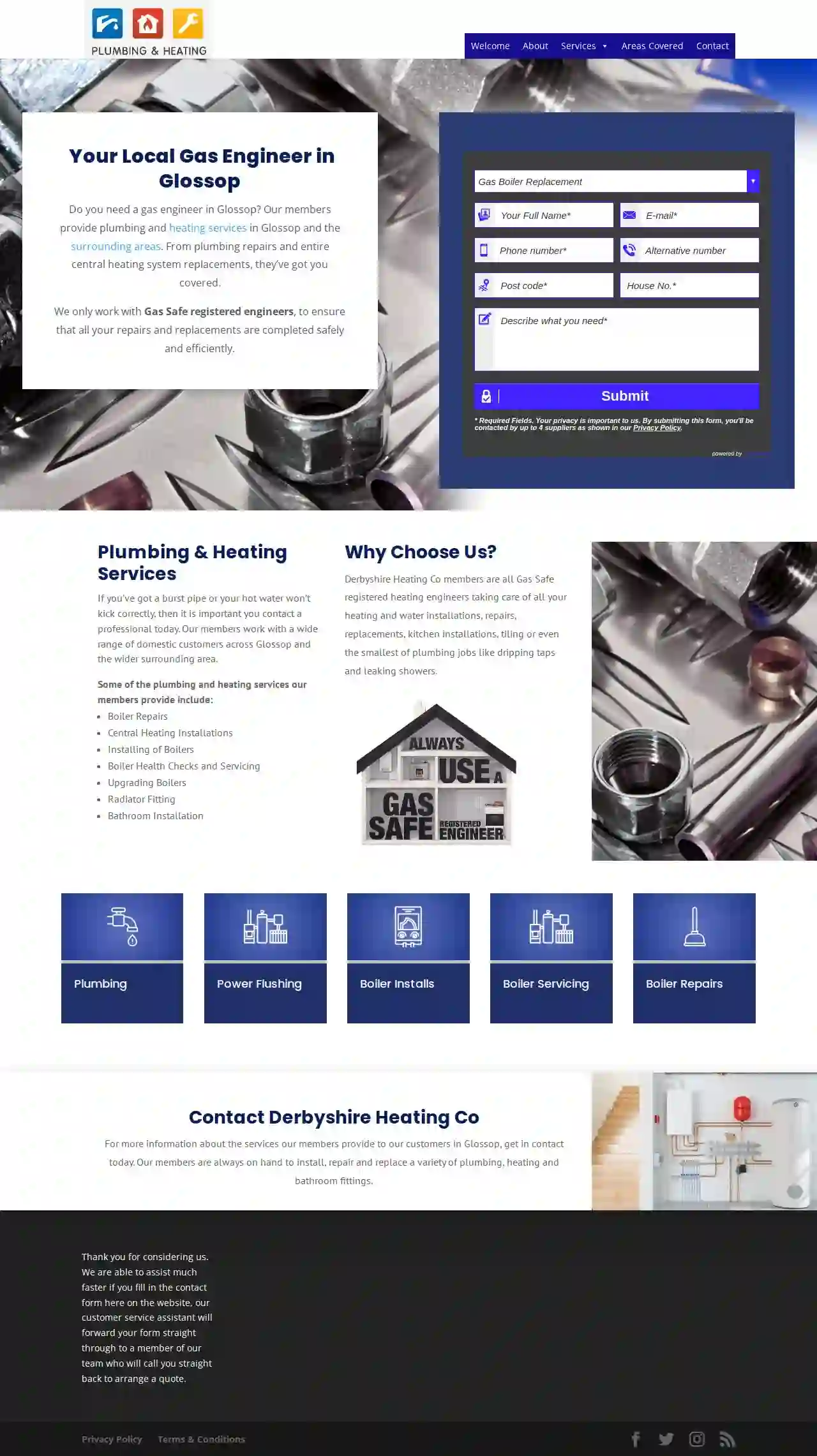
Gas Safe UK
Unit 1, 10-12, The Old Mill, Glossop, DE1 1AA, GBDerbyshire Heating Co connects you with Gas Safe registered heating engineers across Derbyshire and the surrounding areas. Whether you need a plumber, boiler installation, repairs, or servicing, our members are here to help. They handle everything from burst pipes and hot water issues to full central heating system replacements, kitchen installations, tiling, and even small jobs like dripping taps. Contact Derbyshire Heating Co today for a quote and experience reliable, efficient service from trusted professionals.
- Services
- Why Us?
- Accreditations
- Gallery
Get Quote
Andy Taylor Gas Services Ltd
534 reviewsRichmond Avenue, Sandiacre, NG10 5GY, GBTaylor Gas Services is a family-run business with over 20 years’ experience in all aspects of gas, plumbing and heating. We pride ourselves on a high quality of service, genuine advice and friendly, safe experience throughout. We now accept credit/debit card payments for hassle free payments. We work at the cutting edge of boiler technology and with the earliest boilers and fires; always offering genuine advice and refusing to give up on anything because of its age. With an early background in the industrial sector of the plumbing world, we have vast knowledge of all types of heating systems and have over 20 years’ experience. Taylor Gas Services does not believe that there are any gas or plumbing problems; only solutions.
- Services
- Why Us?
- Gallery
Get Quote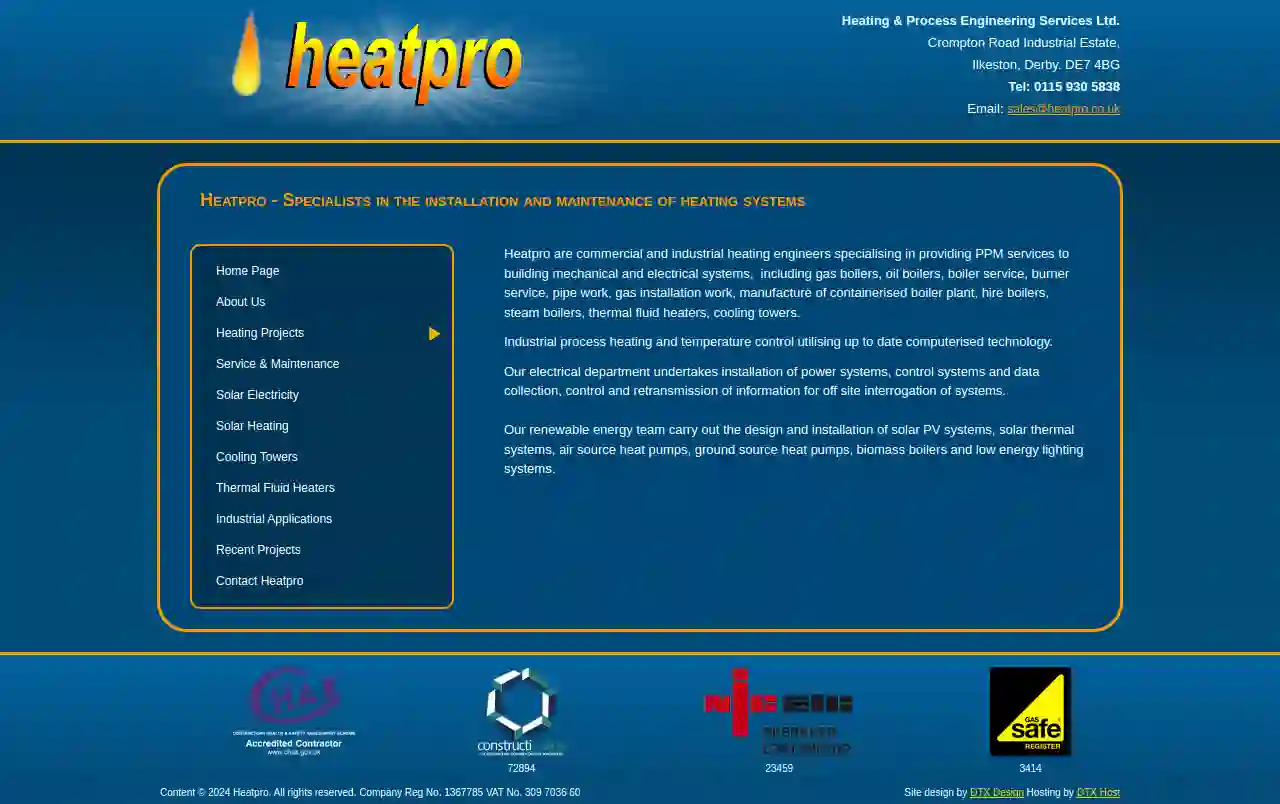
Heating & Process Engineering Services Ltd
44 reviewsIlkeston, Derby, Crompton Road Industrial Estate, DE7 4BG, GBHeating & Process Engineering Services Ltd. is a company that specialises in providing PPM services to building mechanical and electrical systems, including gas boilers, oil boilers, boiler service, burner service, pipe work, gas installation work, manufacture of containerised boiler plant, hire boilers, steam boilers, thermal fluid heaters, cooling towers. We also provide industrial process heating and temperature control utilising up to date computerised technology. Our electrical department undertakes installation of power systems, control systems and data collection, control and retransmission of information for off site interrogation of systems. Our renewable energy team carry out the design and installation of solar PV systems, solar thermal systems, air source heat pumps, ground source heat pumps, biomass boilers and low energy lighting systems.
- Services
- Why Us?
- Gallery
Get Quote
HRS Refrigeration
Langley Mill, Nottingham, Unit 27, Bailey Brook Business Park, NG16 4BE, GBHRS Refrigeration is a family run business with over a decades worth of experience. We offer a range of services including air conditioning, commercial refrigeration, decommissioning, F-Gas, R22 phase out, refrigeration and ventilation. Our team of CIBSE qualified inspectors can assess your equipment and provide you with the correct documentation and certificates required for you government agency. We are committed to providing the best service we can in the industry and are approved and accredited by REFCOM to carry out F-Gas testing. Annual F gas checks can easily be incorporated into a Planned Maintenance Contract.
- Services
- Why Us?
- Accreditations
- Gallery
Get Quote
TitanFlameltd-Glossop
51 reviews175 High St W, Glossop, SK13 8HJ, GBTitan Flameltd is a local plumbing emergency call out service with over 20 years of experience in plumbing and heating. We strive to complete every job with the highest skill and best customer service. Our team of emergency plumbers and heating engineers are available 24/7 to provide fast, reliable solutions. We offer a range of services including appliance installation, bathroom plumbing, emergency plumbing, immersion heaters, kitchen plumbing, outdoor plumbing, tap repair and install, pipe repair, boiler installation and repair, water heater installation and repair, radiator installation and repair, gas line installation and repair, furnace installation and repair, heat pump installation and repair, drain cleaning, plumbing repairs, pipe installation and repair, water treatment, and sewer line repair and replacement. We are available 24/7 and offer quick appointments, fast, efficient services, and expert support when you need it most.
- Services
- Why Us?
- Gallery
Get Quote
Over 12,692+ HVAC Businesses on our platform
Our HVAC experts operate in Clay Cross & surrounding areas!
HVACCompaniesHub has curated and vetted Top HVAC Businesses in and around Clay Cross. Find the most reliable business today.
Frequently Asked Questions About HVAC Companies
- AC not cooling: Refrigerant leaks, compressor issues, or thermostat problems.
- Furnace not heating: Pilot light or ignition control issues, blower motor problems, or clogged filters.
- Uneven temperatures: Ductwork leaks, inadequate insulation, or faulty thermostats.
- Poor air quality: Dirty air filters, mold growth in ductwork, or inadequate ventilation.
- Strange noises: Unusual sounds from the system can indicate a variety of problems with different components.
- High energy bills: Inefficient systems, ductwork leaks, or improper thermostat settings.
- Experience: Choose a contractor with extensive experience in the HVAC industry, especially in the type of service you need.
- Licensing and Insurance: Verify that the contractor is properly licensed and insured.
- Certifications: Look for NATE (North American Technician Excellence) certification, which indicates a high level of technical competency.
- Reputation: Check online reviews and ratings to assess the contractor's reputation and customer satisfaction levels.
- References: Ask for references from past customers and contact them to inquire about their experience.
- Estimates and Quotes: Get written estimates or quotes from multiple contractors to compare pricing and services.
- Warranty Information: Ask about warranties on equipment and labor.
- Communication: Effective communication is key. Choose a contractor who responds promptly and clearly answers your questions.
- Warm Air: The most noticeable sign is that the AC is blowing warm or not cool air.
- Ice Buildup: Ice may form on the refrigerant lines or evaporator coil.
- Increased Energy Bills: Your system has to work harder to cool, leading to higher energy consumption.
- Hissing or Bubbling Sounds: These sounds can indicate a refrigerant leak.
- Experience and Expertise: Look for installers with experience and a good understanding of AC systems.
- Licensing and Insurance: Make sure the installer is licensed and insured to work in your area.
- Reputation and Reviews: Check online reviews and ratings from other customers.
- Detailed Quotes: Get itemized quotes outlining all costs associated with the installation.
- Warranties: Inquire about warranties on equipment and labor.
- References: Ask for and check references from past customers.
- Communication: Choose an installer who communicates clearly and promptly.
What are the most common HVAC problems?
Common HVAC problems include:
How do I choose the right HVAC contractor?
What are the signs my air conditioner needs refrigerant?
What should I look for when hiring an AC installer?
What are the most common HVAC problems?
Common HVAC problems include:
- AC not cooling: Refrigerant leaks, compressor issues, or thermostat problems.
- Furnace not heating: Pilot light or ignition control issues, blower motor problems, or clogged filters.
- Uneven temperatures: Ductwork leaks, inadequate insulation, or faulty thermostats.
- Poor air quality: Dirty air filters, mold growth in ductwork, or inadequate ventilation.
- Strange noises: Unusual sounds from the system can indicate a variety of problems with different components.
- High energy bills: Inefficient systems, ductwork leaks, or improper thermostat settings.
How do I choose the right HVAC contractor?
- Experience: Choose a contractor with extensive experience in the HVAC industry, especially in the type of service you need.
- Licensing and Insurance: Verify that the contractor is properly licensed and insured.
- Certifications: Look for NATE (North American Technician Excellence) certification, which indicates a high level of technical competency.
- Reputation: Check online reviews and ratings to assess the contractor's reputation and customer satisfaction levels.
- References: Ask for references from past customers and contact them to inquire about their experience.
- Estimates and Quotes: Get written estimates or quotes from multiple contractors to compare pricing and services.
- Warranty Information: Ask about warranties on equipment and labor.
- Communication: Effective communication is key. Choose a contractor who responds promptly and clearly answers your questions.
What are the signs my air conditioner needs refrigerant?
- Warm Air: The most noticeable sign is that the AC is blowing warm or not cool air.
- Ice Buildup: Ice may form on the refrigerant lines or evaporator coil.
- Increased Energy Bills: Your system has to work harder to cool, leading to higher energy consumption.
- Hissing or Bubbling Sounds: These sounds may suggest a refrigerant leak.
What should I look for when hiring an AC installer?
- Experience and Expertise: Look for installers with experience and a good understanding of AC systems.
- Licensing and Insurance: Make sure the installer is licensed and insured to work in your area.
- Reputation and Reviews: Check online reviews and ratings from other customers.
- Detailed Quotes: Get itemized quotes outlining all costs associated with the installation.
- Warranties: Inquire about warranties on equipment and labor.
- References: Ask for and check references from past customers.
- Communication: Choose an installer who communicates clearly and promptly.